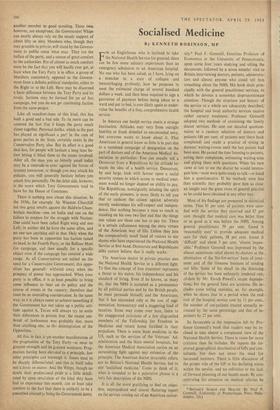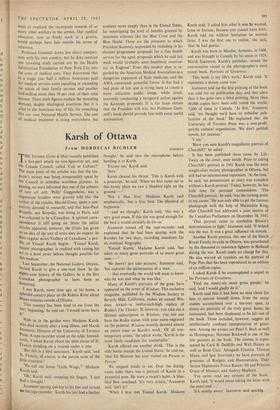Socialised Medicine
By KENNETH ROBINSON, MP FOR an Englishman who is inclined to take the National Health Service for granted, there can be few more salutary experiences than an emergency admission to an American hospital. No one who has been asked, as I have, lying on a stretcher in a state of collapse and haemorrhaging profusely, how he proposes to meet the estimated charge of several hundred dollars a week, and then been required to sign a guarantee of payment before being taken to a ward and put to bed, is ever likely again to under- value the benefits of a free, comprehensive health service.
In America our health service exerts a strange fascination. Attitudes may vary from outright hostility or frank disbelief to unconcealed envy, but everyone wants to know about it. That Americans in general know so little is in part due to a sustained campaign of denigration on the part of doctors and of the American Medical As- sociation in particular: You can usually tell a Democrat from a Republican by his attitude to- wards the idea of a health service. Democrats, by and large, look with favour upon a social security system in which access to medical treat- ment would no longer depend on ability to pay. The Republican, nostalgically inhaling the spirit of the early pioneers, is more likely to tell you that to cushion the citizen against adversity merely undermines his self-respect and indepen- dence, that nothing becomes a man so much as standing on his own two feet and that the things one values are those one has to pay for. There is a certain callousness among the stern virtues of the American way of life. Unless they join the comparatively small band of visitors to our shores who have experienced the National Health Service at first hand, Democrats and Republicans alike cannot believe that it really works.
The American doctor in private practice sees the National Health Service in a different light. To him the concept of free treatment represents a threat to his status, his -independence and his standard of living. Even if he knows, as many do, that the NHS is accepted as a permanency by all political parties and by the British people, he must persuade himself, and the Americans, that it has succeeded only at the cost of regi- mentation, bureaucracy and a staggering load of taxation. Some may come over here, listen to the exaggerated criticisms of a few disgruntled members of the Fellowship for Freedom in Medicine and return home fortified in their prejudices. There is some State medicine in the US, such as the services of the Veterans' Ad- ministration and the State mental hospitals, but the American Medical Association carries on an unremitting fight against any extension of the principle. The American doctor invariably refers, not to Britain's National Health Service, but to our 'socialised medicine.' Come to think of it, what is intended to be a pejorative phrase is a very fair description of the NHS.
It is all the more gratifying to find an objec- tive, unprejudiced and almost flattering report on the service coming out of an American univer- * BRITAIN'S SEARCH FOR HEALTH. By Paul F. Gemmill. (University of Pennsylvania Press, Phila- delphia, 32s.) sity.* Paul F. Gemmill, Emeritus Professor of Economics at the University of Pennsylvania, spent some four years studying and sifting the documents, followed by a seven months' visit to Britain interviewing doctors, patients, administra- tors and almost anyone who could tell him something about the NHS. His book deals prin- cipally with the general practitioner services, to which he devotes a somewhat disproportionate attention. Though the structure and history of the service as a whole are adequately described, the hospital and local authority services receive rather cursory treatment. Professor Gemmill adopted two methods of examining the family doctor services. He sent out detailed question- naires to a random selection of doctors and patients (40 per cent. of patients sent them back completed) and made a practice of sitting in doctors' waiting-rooms until the last patient had been seen. He passed the time listening to patients, noting their complaints, estimating waiting-time and plying them with questions. When his turn came at last to see the doctor he would interro- gate him—most were quite ready to talk—or hand him a questionnaire. If his methods were less than scientific they probably gave him as close ' an insight into the grass roots of general practice as he could have obtained in any other way.
Most of his findings are presented in statistical terms. Thus 91 per cent. of patients were satis- fied with the service they received and 87 per cent. thought that medical care was .better than or as good as it was before the NHS. Among general practitioners 59 per cent. found it 'reasonably easy' to provide adequate medical care for their patients, 38 per, cent. found it 'difficult' and about 3 per cent. 'almost impos- sible.' Professor Gemmill was impressed by the almost unanimous relief shown by•doctors at the elimination of the lee-for-service' basis of treat- ment and of the tiresome business of sending out bills. Some of his detail on the financing of the service has been unhappily rendered out, of-date by Mr. Enoch Powell's recent depreda- tions, but the general lines are accurate. He in, eludes some telling statistics, as, for example, when he shows that in a period when the real cost of the hospital service rose by 11 per cent., the number of out-patients treated annually in- creased by the same percentage and that of in- patients by 27 per cent.
So favourable is the impression left by Pro- fessor Gemmill's book that readers may be in- clined to take almost a complacent view of the National Health Service. There is room for more criticism than he includes. He reports the im- proved geographical distribution of GPs and con- sultants, but does not stress the need for increased numbers. There is little discussion of ; the proper role of the GP or his declining status within the service, and no reference to the lack , of forward planning of our health needs. By con- centrating his attention on medical salaries he tends to overlook the inadequate rewards of so many other workers in the service. Our medical education, now so firmly stuck in a groove, Would perhaps have lain outside his terms of reference.
Professor Gemmill draws few direct compari- sons with his own country, but he does mention Otte revealing study carried out by the Health Information Foundation of New York City into the costs of medical care. They discovered that in a single year half a million Americans paid for medical services sums equalling or exceeding the whole of their family income, and another half-million more than 50 per cent. of their total income. These stark figures explain the mounting demand, despite ideological assertions that it is alien to the American way of life, for something like our own National Health Service. The cost of medical treatment is rising everywhere, but nowhere more steeply than in the United States, far outstripping the level of benefits granted by insurance schemes like the Blue Cross and the Blue Shield. These are the pressures to which President Kennedy responded by including in his election programme proposals for a free health service for the aged, proposals which he said last week would 'probably seem hopelessly reaction- ary in England.' Even this modest plan is re- garded by the American Medical Association as a dangerous expansion of State medicine, and the AMA commands powerful forces. It has had a bad press of late and is trying hard to create a more attractive public image, while simul- taneously conducting a rearguard action against the Kennedy proposals. It is far from certain that the President will win, but Professor Gem- mill's book should provide him with some useful ammunition.















































 Previous page
Previous page